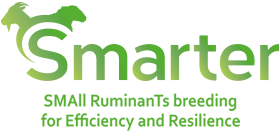
This project has received funding from the European Union’s Horizon 2020 research and innovation programme under grant agreement No 772787.
International Evaluation of Dairy Sheep in Smarter
– by A. Legarra We work with two groups of breeds from western Pyrenees, the black-faced (Manech Tête Noire and Latxa Cara Negra from Navarre), and the blond faced (Manech Tête Rousse and Latxa Cara Rubia). These breeds follow separate breeding schemes although with frequent exchanges, in particular in the last 10 years. Therefore, there […]
EAAP invited review paper Livestock disease resilience: from individual to herd level
– by A. Doeschl-Wilson et al. Infectious diseases are a major threat to the sustainable production of small ruminants and other livestock species. Control efforts, such as vaccination or breeding approaches often target improvements to individual resilience to infections, i.e. they strengthen an animal’s ability to cope with infection, rather than preventing infection per se. […]
Selection on functional longevity in a commercial population translates into significant differences in longevity, and resilience, in a common farm environment
– by M. Ithurbide, C. Huau, I. Palhière, T. Fassier, N.C. Friggens, R. Rupp The aim of the first article of Marie Ithurbide’s PhD (submitted to JDS in august 2021) was to validate the use of functional longevity as an indicator of resilience for selection. To address this question, we created 2 divergent lines of […]
Meta-analysis of genetic parameters for resilience and efficiency traits in goats and sheep
– by S. Mucha, F. Tortereau, A. Doeschl-Wilson, R. Rupp, J Conington Genetic selection focused purely on production traits has proven very successful in improving the productive performance of livestock. However, heightened environmental and infectious disease challenges have raised the need to also improve the resilience of animals to such external stressors, as well as […]
Editorial
SMARTER is almost at the end of the second period (M36 in October 2021). Once again, we will have our next annual meeting by video conference because of the COVID crisis. The agenda for the remote SMARTER includes 3-hours meetings per WPs from 11th to 22nd of October and will allow for an overview of […]
PhD students in SMARTER project: Quentin Le Graverand, Camila Balconi Marquez, Gracialda Ferreira
Quentin Le Graverand (PhD student – INRAE) Title of the thesis: Identification of predictors for the genetic evaluation of feed efficiency in meat sheep (This PhD Thesis is supported by the SMARTER and GrassToGas project). Feed efficiency is an important trait to include in breeding programs given its impact both at the economic and environmental […]
Stakeholders activities
by C. Mosconi In 2021, the dissemination activities for stakeholders will be focused on the ten National Round Tables to be organized in the second part of the year and on the ICAR Annual Conference to be held in Leeuwarden (26-30 April). The ten national round tables (NRT) In the second part of 2021 until […]
INIA UY participation on The European Researchers’ Night
by G. Ciappesoni INIA Uruguay participated in the Iberoamerican Researchers’ Night (part of European Researchers’ Night) with the proposal “Spain-Uruguay linked by sheep: from the Adelantados to genomics”. It was an activity aimed at high school students and the general public. This presentation showed some of the genetic and cultural links between both countries with […]
Case study: Can the Irish sheep industry benefit from using New Zealand genetics?
by N. Fetherstone, F. Hely, N. McHugh, and P. Amer Using a gene flow model, it was investigated whether the Irish sheep population would benefit from elite maternal germplasm sourced from Irish or New Zealand flocks, and if so, how best to incorporate that germplasm to maximise genetic gain. The model quantified the genetic improvement, […]
Practical Selection Tools to Benefit from International Cooperation (WP6) – Updates
by J.M. Astruc, D. Berry A plenary WP6 meeting was held on 15 December 2020 and the main outcomes were presented at the Wrap Up meeting on 14 January 2021. As the prerequisites for setting up international evaluation are mainly achieved, the across-country evaluation will be implemented in 2021. Pedigree and phenotypic data (and in […]

